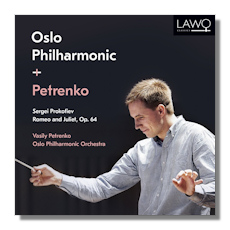
The Internet's Premier Classical Music Source
Related Links
- Prokofieff Reviews
- Latest Reviews
- More Reviews
-
By Composer
-
Collections
DVD & Blu-ray
Books
Concert Reviews
Articles/Interviews
Software
Audio
Search Amazon
Recommended Links
Site News
 CD Review
CD Review
Serge Prokofieff

Romeo and Juliet, Op. 64
Oslo Philharmonic Orchestra/Vasily Petrenko
Lawo LWC1105 2CDs 144:48 (78:52 + 65:56)
Prokofiev's ballet Romeo and Juliet has been one of his most popular works for decades, but most listeners are familiar with its music from the three suites Prokofiev fashioned from the work or from excerpts conductors have put together in various ways. Thus, while there have been ample recordings of the complete ballet, both on CD and video, a new recording is always welcome. This one from rising star Vasily Petrenko and the Oslo Philharmonic deserves attention not just because it is the latest one, but because of its very convincing treatment of the work's tragic character. But it's not without flaws.
Tempos are generally moderate, though the tragic music in the latter part is taken rather slowly – but convincingly phrased and performed. Overall, at nearly two hours and twenty-five minutes this performance is slightly on the expansive side. There is one notable outlier here: the Interlude (track 8) in the First Act. Marked Andante Pomposo, Petrenko takes it as if it were a very lively allegro. It is not played at a "walking" pace at all – more like a running one – and it is hardly "pompous". Petrenko is more than twice as fast as the admittedly expansive Previn here (1:23 vs. 3:10!) and nearly double the speed of the moderate Ozawa (2:15).
What is a little stranger, though, is the orchestration used in certain numbers: try Act II, Folk Dance (track 22) and Dance of the Five Couples (track 24). The instrumentation is beefed up and somewhat garish in style, totally unlike the more subtle orchestration used in recordings by Gergiev (thrice), Ozawa, Ermler, Previn, Maazel and probably almost every other complete recording. It sounds similar to the orchestration used by conductor David Garforth in his DVD performance of Romeo and Juliet from La Scala, that I reviewed here in 2004 (TDK DVBLRAJDVD). There I suspected that this might be the work of Boris Pogrebov, who was engaged by some meddlers to make revisions in Prokofiev's orchestration for Soviet productions of this ballet. The first two tracks on Disc 2, Public Merrymaking and Further Public Festivities, also divulge this sort of "beefed up" treatment of the orchestration. The last track of disc one, Juliet at Friar Laurence's, divulges a slight instrumental difference, but I noticed no other obvious ones in Petrenko's version here. In the end, these five numbers of the work's fifty-two still come across reasonably well and some listeners may actually prefer them this way. That said, I choose to nitpick and favor the common, more subtle scoring.
Those minor complaints aside, I must say the pluses far outweigh the minuses here. One can observe that Petrenko takes a rather carefully crafted symphonic view of the work, focusing in the first half on the youthful joy and love of Romeo and Juliet, and then on the development and inevitability of their shared tragedy in the last half. His phrasing points up the colorful and lush character of the score in Act I and the first half of Act II and then darkens for the remainder of the Act and Act III, tempos slowing a bit, the often transparent textures yielding a sense of bleakness, and the last two numbers, Juliet's Funeral and Juliet's Death, exuding a heartrending sorrowfulness whose beauty can take the listener to an ecstasy of tears. Oh how some ballets and operas can make tragedy so utterly bearable, so beautiful. This recording may well capture the darker side of this music better than any other.
Vasily Petrenko has served as Principal Conductor of the Oslo Philharmonic Orchestra since 2013. The ensemble plays splendidly for him throughout the ballet, and overall I would rank this effort as a strong rival of my previous favorites in this ballet, the Previn (EMI), Maazel (Decca), and Ozawa (DG). But Petrenko has an advantage over those earlier recordings in the clear and well balanced sonics provided by the Norwegian label LAWO. Prokofiev and ballet mavens will find this a most rewarding pair of discs. Strongly recommended!
Copyright © 2017, Robert Cummings


















